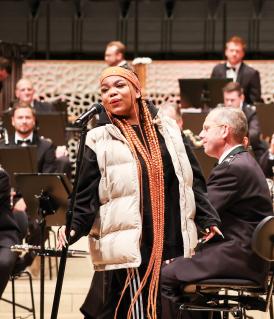Intercultural Dialogue

Foreign cultural and educational policy is a core element of a comprehensive foreign policy. Sharing ideas through exchange and cooperating on culture and education, academia and research create “pre-political spaces” and form the basis for sustainable foreign policy for societies. It is through the dialogue between people and civil society organisations that new ways towards shared perspectives can be found. This also creates a basis to defuse conflicts and crises at an early stage, or even to prevent them.
Cultural and educational programmes promote exchanges
Germany’s foreign cultural and educational policy also promotes the German language around the world, with the aim of raising awareness of Germany as a culture with a rich and diverse cultural life. Current initiatives include promoting a variety of cultural programmes such as exhibitions, cooperation projects by German theatres, supporting literature and films, along with various education programmes such as the PASCH initiative (“Schools: Partners for the Future”), a network of more than 2,000 schools that offer German as a foreign language. Foreign cultural and education policy also covers projects in dialogue with the Islamic world and “kulturweit”, a project that allows young people from Germany to spend a year doing voluntary service abroad. To deliver foreign cultural and education policy, the Federal Foreign Office mainly works with private intermediaries with a range of specialisms. These include the Goethe-Institut, the ifa, the German Academic Exchange Service ( DAAD DAAD The German Academic Exchange Service (DAAD) is an organization run jointly by the German institutes of higher education. Its purpose is to promote relations between higher education institutes in Germany and abroad, especially through exchange schemes between students and academics. As a rule its… Read more › ), the German Commission for UNESCO, the Deutsche Auslandsgesellschaft, and the Alexander von Humboldt Foundation Humboldt Foundation The Alexander von Humboldt Foundation was founded in 1860 and today promotes academic collaboration between excellent foreign and German researchers. Every year it enables 2,000 international researchers to spend time working in Germany and maintains a worldwide network of some 30,000 Humboldtians… Read more › . The Federal Foreign Office also partners with political, private and business-financed foundations, civil society organisations and subordinate authorities.
Foreign cultural policy values a holistic view of culture that acknowledges the effect that culture can achieve in terms of foreign and social policy. This includes the significance for societies of their cultural heritage. Germany’s programme to preserve cultural assets around the world helps foster cultural identities. The programme has helped preserve manuscripts from Timbuktu in Mali, as well as making digital recordings of traditional music from Afghanistan and conserving the Angkor Wat UNESCO World Heritage site. In the period from 1981 to 2023, Germany provided more than 90 million euros to fund over 3,700 projects in 146 countries.
Returning bronzes to Africa – Setting a new standard
In July 2022 Germany and Nigeria agreed on a historic return of the “Benin Bronzes” from West Africa. These sculptures were taken to German museums after they were looted during the colonial era. The agreement introduced a new phase of the cultural partnership. It strengthens the partnerships between the museums and intensifies joint archaeological projects in order to give more people access to these works of art. The agreement, which is supported by the Federal Government Federal Government The Federal Government and cabinet is made up of the Federal Chancellor and the Federal Ministers. While the Chancellor holds the power to issue directives, the ministers have departmental powers, meaning that they independently run their respective ministries in the framework of those directives… Read more › , the states and Germany’s museums, is a clear sign that Germany is increasing its efforts to engage with the responsibility that arises from colonialism.


